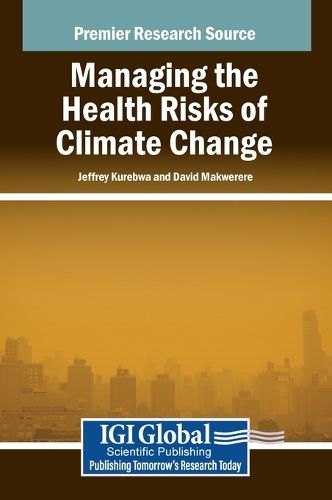Readings Newsletter
Become a Readings Member to make your shopping experience even easier.
Sign in or sign up for free!
You’re not far away from qualifying for FREE standard shipping within Australia
You’ve qualified for FREE standard shipping within Australia
The cart is loading…






This title is printed to order. This book may have been self-published. If so, we cannot guarantee the quality of the content. In the main most books will have gone through the editing process however some may not. We therefore suggest that you be aware of this before ordering this book. If in doubt check either the author or publisher’s details as we are unable to accept any returns unless they are faulty. Please contact us if you have any questions.
Climate change presents a fundamental threat to human health. It has affected the physical environment and all aspects of both natural and human systems. It is therefore a threat multiplier, undermining and potentially reversing health progress made during the last three decades. As climatic conditions change, more frequent and intensifying weather and climate events are observed such as storms, extreme heat, floods, droughts, and wildfires. These weather and climate hazards affect health both directly and indirectly, increasing the risk of deaths, non-communicable diseases, the emergence and spread of infectious diseases, and health emergencies. Managing these health risks requires coordinated global efforts to strengthen public health systems and build resilience in vulnerable communities. Managing the Health Risks of Climate Change provides new evidence on the health risks posed by climate change, offering a comprehensive analysis of how environmental changes are impacting human health. It further explores emerging strategies for managing these risks, highlighting innovative approaches to adaptation, mitigation, and the strengthening of health systems to better prepare for and respond to climate-related health challenges. Covering topics such as air conditioning, persons with disabilities, and women's health, this book is an excellent resource for academicians, researchers, policymakers, health practitioners, and more.
$9.00 standard shipping within Australia
FREE standard shipping within Australia for orders over $100.00
Express & International shipping calculated at checkout
This title is printed to order. This book may have been self-published. If so, we cannot guarantee the quality of the content. In the main most books will have gone through the editing process however some may not. We therefore suggest that you be aware of this before ordering this book. If in doubt check either the author or publisher’s details as we are unable to accept any returns unless they are faulty. Please contact us if you have any questions.
Climate change presents a fundamental threat to human health. It has affected the physical environment and all aspects of both natural and human systems. It is therefore a threat multiplier, undermining and potentially reversing health progress made during the last three decades. As climatic conditions change, more frequent and intensifying weather and climate events are observed such as storms, extreme heat, floods, droughts, and wildfires. These weather and climate hazards affect health both directly and indirectly, increasing the risk of deaths, non-communicable diseases, the emergence and spread of infectious diseases, and health emergencies. Managing these health risks requires coordinated global efforts to strengthen public health systems and build resilience in vulnerable communities. Managing the Health Risks of Climate Change provides new evidence on the health risks posed by climate change, offering a comprehensive analysis of how environmental changes are impacting human health. It further explores emerging strategies for managing these risks, highlighting innovative approaches to adaptation, mitigation, and the strengthening of health systems to better prepare for and respond to climate-related health challenges. Covering topics such as air conditioning, persons with disabilities, and women's health, this book is an excellent resource for academicians, researchers, policymakers, health practitioners, and more.